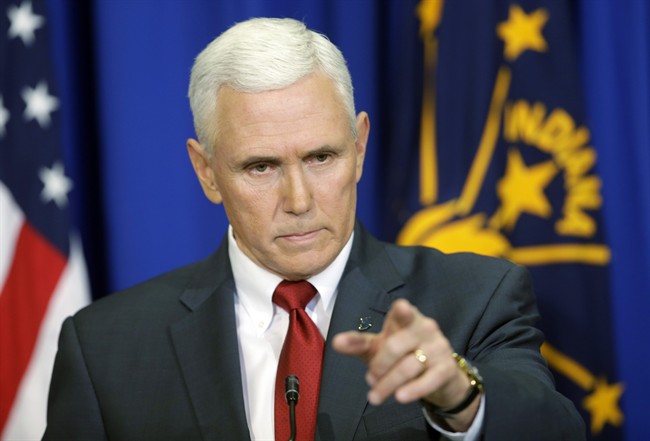WATCH: New legislation in Indiana has provoked outrage over accusations it allows businesses to discriminate against gays and lesbians on moral grounds. The national uproar is so great, Indiana’s governor has now promised make concessions. Jackson Proskow reports.
TORONTO – Indiana’s Religious Freedom Restoration Act – which seeks to support religious freedom by seemingly allowing for discrimination – likely wouldn’t be passed in Canada.

That being said, Canadian courts have had to deal with discrimination cases based on sexuality, gender, and religion. And they haven’t always sided on one side or the other.
But if the bill, as written, were transplanted into Canada, the law would effectively try to override provincial Human Rights Acts which prohibit discrimination based on gender and sexuality.
“It would become a flashpoint for constitutional debate,” Benjamin Berger, an associate professor at Osgoode Hall Law School said during an interview Tuesday.
Tension between what’s public and what’s private
Canadian courts generally try to find a balance between minority rights and religious rights.
“The two poles that are always in tension are… that religious freedom and religious equality is a strong commitment of our legal and constitutional frame but commitment to equal rights, commitment to human rights, commitment to equality is also,” Berger said.
“These cases are very much about the messiness of the line between private and public conduct.”
READ MORE: Indiana’s largest newspaper calls on state to ‘fix’ religious freedom bill
One notable case happened in Oshawa in 2002. Ontario Superior Court Justice Robert McKinnon ruled that Marc Hall, a student at a Roman Catholic high school, would be allowed to take his boyfriend to the prom.
There’s been other tests as well, including Catholic high schools attempting to ban gay-straight alliances, a teacher who was fired for changing gender, and the Vriend v. Alberta case in 1998 which forced the province to include sexual orientation in its human rights code.

Get daily National news
Another case was settled much more recently. Loyola High School, a private, religious-based high school in Quebec recently tried to opt-out of the province’s Ethics and Religious Culture program, which required them to teach neutral lessons about various religions. The school argued they should be allowed to teach the course from the Catholic perspective.
A divided Quebec Supreme Court ruled on March 19 that the school would have to teach the course neutrally, except when teaching Catholicism.
“To ask a religious school’s teachers to discuss other religions and their ethical beliefs as objectively as possible does not seriously harm the values underlying religious freedom,” wrote Justice Rosalie Abella.
“But preventing a school like Loyola from teaching and discussing Catholicism in any part of the program from its own perspective does little to further those objectives while at the same time seriously interfering with the values underlying religious freedom.”
Religious rights for corporations
The Indiana law extends some religious rights to institutions and businesses, something that doesn’t generally happen in Canada.
“But there’s no sense in Canada that a private for-profit corporation in Canada has any claim to freedom of expression,” Richard Moon, a law professor at the University of Windsor said.
Moon said that if a florist in Canada were to deny service to a same-sex couple based on their religious beliefs, the florist’s argument would likely lose in court.
But some religious groups have been given rights in Canada, Moon said. He pointed to a 1984 case in British Columbia where a woman married a divorced man in a civil ceremony. She was fired from the private, Catholic school at which she worked. The courts upheld the school’s right to give preference to members of their own religion.

Why Indiana thinks it needs the legislation
Indiana’s Religious Freedom Restoration Act aims to prohibit laws that would “substantially burden” a person – which includes business, organizations, and institutions – from exercising their religious beliefs.
The bill has been met with harsh criticism with opponents alleging it allows businesses to discriminate against LGBTQ people.
Supporters of the bill have promised to clarify it, saying it wasn’t meant to exclude anyone.
Richard Moon, a law professor at the University of Windsor, said in an interview Tuesday that it’s important to know what motivated the American law. The legislation is very common in the United States and seeks to give people the freedom of expression they thought they had under their constitution after the Supreme Court said states could restrict religious freedom for legitimate reasons.
Canadian courts also grant the government the ability to restrict religious expression but they are also mandated by the Charter of Rights and Freedoms to do so as little as possible and justify it.
But it’s highly unlikely a similar bill would work in Canada – not only because it’s difficult to imagine a legislator trying to introduce it in the House of Commons – but also because Canada has layers of laws – including the charter – which protect against discrimination, Cheryl Milne, the executive director of the David Asper for Constitutional Rights said in an interview.
“It isn’t just because of the charter; it’s also because each province has human rights legislation that covers this as well. So that individuals and businesses are not to discriminate, and most of them, I think all now, have sexual orientation as one of the grounds for discrimination.”
– With files from The Canadian Press and The Associated Press





Comments